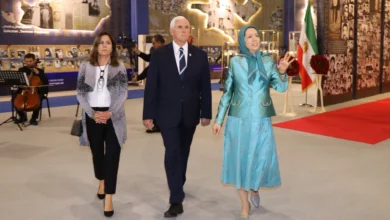Around 20 former members of parliament, including independents and opposition party members, protested on Monday outside the State Council Court in the southern Cairo district of Doqqi to reiterate calls for the establishment of a "parallel parliament" or a "popular parliament" to shadow the recently elected People's Assembly.
Nearly 100 supporters took to the streets to demonstrate their support for the cause and watch the former MPs take a constitutional oath to honor the will of the Egyptian population.
During the rally, the MPs argued that the new parliament, overwhelming dominated by the ruling National Democratic Party (NDP), was handpicked via a process of systematic electoral fraud and widespread vote-rigging, at the expense of opposition and independent candidates.
"We are still deliberating as to the make-up, functions and powers of this parallel parliament," Hamdeen Sabbahi, a former MP from the Nasserist Karama Party, who lost his seat during the 28 November elections, told Al-Masry Al-Youm. "We intend on holding our first session in January."
"The establishment of this democratic People's Assembly is an act of popular civil disobedience," he said, with the aim of confronting "the ruling party, which does not abide by democratic standards."
Another MP who lost his seat during the elections, Mustafa al-Gindi, said, "We hope that the administrative courts and the Supreme Constitutional Court will issue verdicts calling for the dissolution of this unrepresentative parliament. And we demand that their verdicts be respected, implemented and upheld."
"All legislation and draft laws will be put forth before the parallel parliament which will study their provisions," he added. "We intend on consulting the populace regarding these laws via our offices, telephone, fax, and the internet."
Several prominent leaders outlined the need for the parallel parliament in an environment such as Egypt, which lacks, according to critics, a true semblance of democracy. Former leader of the independent bloc in parliament Gamal Zahran alleged that the ruling NDP does not honor basic democratic principles, while opposition leaders such as independent former MP Mustafa Bakri and Wafd Party former MP Rami Lakkah urged the immediate dissolution of what they termed the state-sanctioned People's Assembly.
Others called outright for new elections, to be conducted in an free and fair environment.
Lakkah said the planned parallel parliament "will be a symbolic assembly." He added that its members had not yet determined it constituents, the date of its formal establishment, the exact date for its first session, or its functions.
The objective of the alternate body, albeit vague, is clear in the eyes of opposition leaders.
"We seek the establishment of a genuine parliament, a representative parliament, as opposed to the falsified parliament that exists today," Akram al-Shaaer, one of 88 former MPs from the Muslim Brotherhood bloc in the last parliament, told Al-Masry Al-Youm. "The mandates of the parallel parliament will include monitoring the functions of the official parliament, and discussing proposed legislation, so as to ensure their accountability before the Egyptian people."
He added that the parallel parliament would also serve to ensure that the official parliament is not controlled by foreign powers such as the US and Israel.
Aside from initiating the parallel parliament, opposition leaders and independents remain steadfast in their pursuit of the implementation of court decisions that ruled electoral contests in 98 districts across Egypt null and void due to electoral transgressions. Some leaders, such as Wafd Party former MP Alaa Abdel Moneim, expressed confidence that the Egyptian judiciary will rule in favor of justice and democracy.
The new, enlarged, and contentious parliament includes 518 members, with only 14 members belonging to opposition parties, and 70 independents. The ruling NDP captured 420 seats during the elections, while the president appointed another ten MPs who are either NDP members or are very closely associated with the ruling party.




